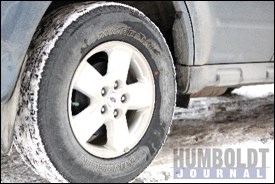On the icy and treacherous roads of Humboldt, winter tires are often the only things standing between drivers and snow banks. Oddly enough, the majority of Saskatchewan drivers don't have them.
"A lot of people aren't educated on the benefits of winter tires," said Carolyn Goard, a spokesperson for the Rubber Association of Canada (RAC). "They don't realize how fantastic they are. They figure they (the tires) are all season, so they can wear them all year round."
According to a news release by the RAC, approximately two-thirds of Saskatchewan drivers don't equip their vehicles with winter tires. Aside from the misconception about all-season tires, many people also believe that winter tires are only necessary when the roads are covered in snow or ice.
According to Goard, however, winter tires are made up of a special rubber compound that retain elasticity and grip the road better in all temperatures and icy conditions. The all-season tires, in comparison, will start to harden in colder temperatures.
"Winter tires significantly reduce braking stopping distances on all cold-weather road surfaces," said the RAC news release. "For example, at temperatures just below freezing on dry pavement winter tires have been shown to reduce stopping distances by as much as 30 per cent compared to all-seasons."
The fact that only about a third of Saskatchewan drivers equip their vehicles with winter tires isn't a surprise to Brian Manning. As the manager of Humboldt's Kal Tire location, he sells tires to many of the local residents.
"This month is the busiest of the year for us, but still a lot of people don't get winter tires because they think all-season works well enough," he said. "We need to help educate the consumer as to the importance the difference is between all-season and winter tires."
For those who don't want to be bothered by the hassle of changing their tires twice a year, Manning suggests an alternative: all-weather tires. All-weather tires are different from all-season in that they can stay on all year round and will hold up to all weather conditions.
"Often times people have issues with storage for an extra set of tires or the cost of changing their tires or getting them off on time," he said. "The all-weather tires have various mileage ratings and a warranty that protects them in case they don't use that mileage."
There is very little difference between the two tires. While the winter tires work a bit better in the winter, the all-weather tires cost slightly less. Nonetheless, Manning said both would work just as well in the weather conditions seen in Humboldt.
"People need to experience it and compare it to what they're accustomed to to really see the value in it," he said.
With regards to the tires themselves, tire inflation is key to keeping them properly maintained, said Goard. Tire pressure can fluctuate depending on the changing temperature. Beyond that, average winter tires should last three to four winters if they're being changed appropriately according to the season.
"Some drivers unwisely opt not to use winter tires because their vehicle is equipped with anti-lock braking systems, all-wheel drive or four-wheel drive," said a Traffic Injury Research Foundation (TIRF) report. "These systems however require sufficient traction to be effective and winter tires provide that needed traction."
Furthermore, the TIRF report states that use of proper tires can reduce fuel consumption by up to five per cent. The life of summer tires is prolonged as a result. Moreover, some insurance companies offer premium reductions for using winter tires.
"The biggest thing that most people comment is that it's like night and day compared to all-season tires," said Manning. "Especially for those that drive winter tires for the first time, they're surprised at the braking on icy conditions."

.png;w=120;h=80;mode=crop)


